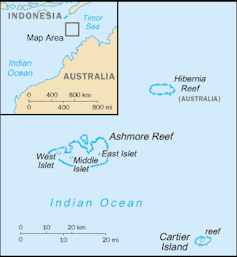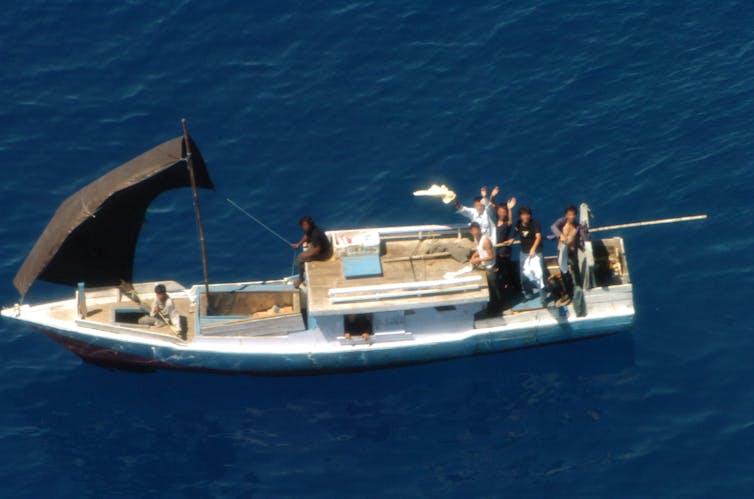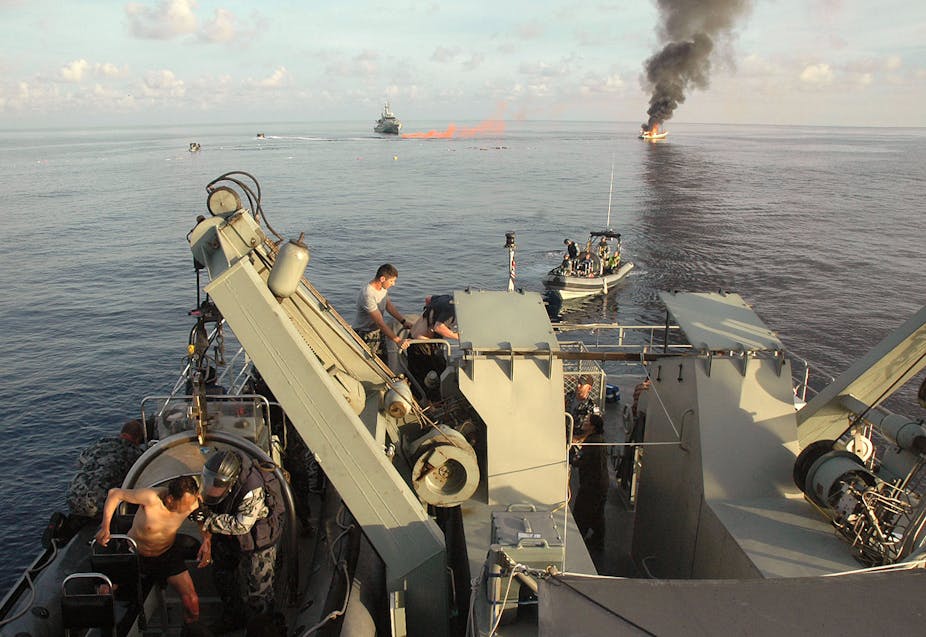Despite arrivals of asylum seekers by boat being a major political issue for Australia over the last decade, the Indonesian government has not regarded the presence of asylum seekers and refugees with nearly the same urgency. In fact, for almost a decade the Indonesian government has reacted towards them with what could be described as a “benevolent neglect”.
By and large, asylum seekers and refugees do not attract sympathy in Indonesia, with the exception of the tragic disasters at sea. More interest is reserved for the hundreds of imprisoned Indonesian fishermen, some of whom are underage, who are serving sentences in Australia for having shipped asylum seekers to the “Lucky Island”. However, it is also the case in Indonesia that local fishermen and other transporters face minimum five year prison terms when caught and put on trial. Since the enactment of the new Law on Immigration in May 2011, there have been a number of trials for local and foreign people smugglers.
Journey to ‘Lucky Island’
The two most common routes to Australia from Indonesia are from Lombok, Sumba, Sumbawa or Timor via Sabu or Rote to the 170km-distant Ashmore Reef and from the South Java Coast to Christmas Island, a 400km long journey though open sea.

Previously, most transit people were transported to Eastern Indonesia for departure. At the moment it is the boat crews that are transported to take the boat people from Java.
Intensified border surveillance and more frequent arrests, and to some extent, persecution, create higher risks for people smugglers. These risks force networks to adapt by choosing new routes or paying higher bribes. The inflated prices have to be paid in turn by the transit migrants. Whereas in the late 1990s a passage from Indonesia to Australia cost around US$2000, nowadays prices range between US$5-8000.
Surveillance and awareness raising
In order to sensitise police and immigration officers to irregular migration, the International Organisation for Migration (IOM) in cooperation with the Indonesia Police and the Department of Immigration has held hundreds of seminars all over Indonesia during the last three years.
Officers on the ground were trained on how to recognise, arrest and deal with irregular migrants. Besides the local police, special awareness campaigns also targeted staff in areas known to be frequent transit points, such as bus, taxi, aviation and ferry companies. And over the past few years, anti-people smuggling propaganda has been deployed widely to prevent local fishermen becoming involved in people smuggling.
Strategies included the distribution of compilations of Christian and Muslim sermons among Christian and Muslim preachers with the core message that assisting people to go to Australia will result in severe punishments. The increase in the number of locals reporting foreigners to the authorities has been attributed to the anti-people smuggling campaigns. But knowing about the possible legal consequences does not mean that poor fishermen will resist being involved in transporting asylum seekers to Australia. Recruiters of ship crews intentionally focus on unmarried and underaged boys, knowing they face less severe punishments when sentenced.
Interceptions
Indonesia’s borders remain porous despite increased awareness-campaigns and border surveillance to counter people smuggling. The three brand new patrol boats provided by the Australian government in late 2011 to enable the Indonesian Maritime Police to patrol more than 40,000 kilometres of coast-line seem rather inadequate.
Although the Indonesian Maritime Police have their own boats, these are often not ocean-going. Maritime patrols are costly in terms of fuel and maintenance, to the point that interceptions rarely happen in the open sea. Asylum seeker arrests mostly take place at the beach before boarding a boat or on the road or in hotels further inland. Hardly a single day passes without interceptions somewhere around the archipelago.
Once intercepted, police and the immigration officers examine the arrested migrants and then send them to one of the 13 detention centres in Indonesia. The conditions in these centres are often substandard compared to Western standards, but generally slightly better than in Indonesian prisons.
Law enforcement
During interceptions, the police occasionally arrest transporters.
The real brains that set up these smuggling ventures, however, are rarely in the field. The Indonesian special unit for people smuggling claims to have cracked down on people-smugglers, but far more Indonesians than foreigners have been detained.
In 2011, for example, three foreigners and 24 Indonesians were arrested for people smuggling. Whereas asylum seekers can avoid legal consequences for breaking the immigration laws when they apply for asylum, their transporters face the law.

Evidently, not all cases of arrest go to court. Lack of evidence or, more specifically, lack of will to find evidence, saves some suspects from penalty. Nevertheless, there are an increasing number of cases going to court, resulting in harsher sentences than those imposed in the past.
Taking a closer look at some of the trials, it becomes obvious that it is most often the chauffeurs and the boat crew who stand trial. According to Ferdinand Lolo, a former prosecutor with the Attorney-General Office, smuggling bosses tend to have good links with the authorities and it’s often the lowest-ranking members in the hierarchy who are deliberately sacrificed in order to protect the ones further up the chain.
The eagerness of impoverished fishermen to be recruited enables smuggling bosses to easily exchange lower positions, such as drivers, with new staff. So far, only few organisers of people smuggling have been arrested and incarcerated. Recent reports have shown that the criminal elements of the Indonesian police and navy involved in the people smuggling business have hindered sentencing.
Despite Indonesia responding to Australia‘s pressure and funding in the past two years by intensifying its anti-people smuggling activities and carrying out more interceptions, arrests and trials with harsher sentences, asylum seekers are still getting on the unseaworthy boats en route to Australia.
The fundamental problem – what to do with the increasing numbers of transit migrants coming to Indonesia for whom fast resettlement is unavailable – remains unsolved.

